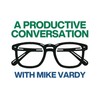
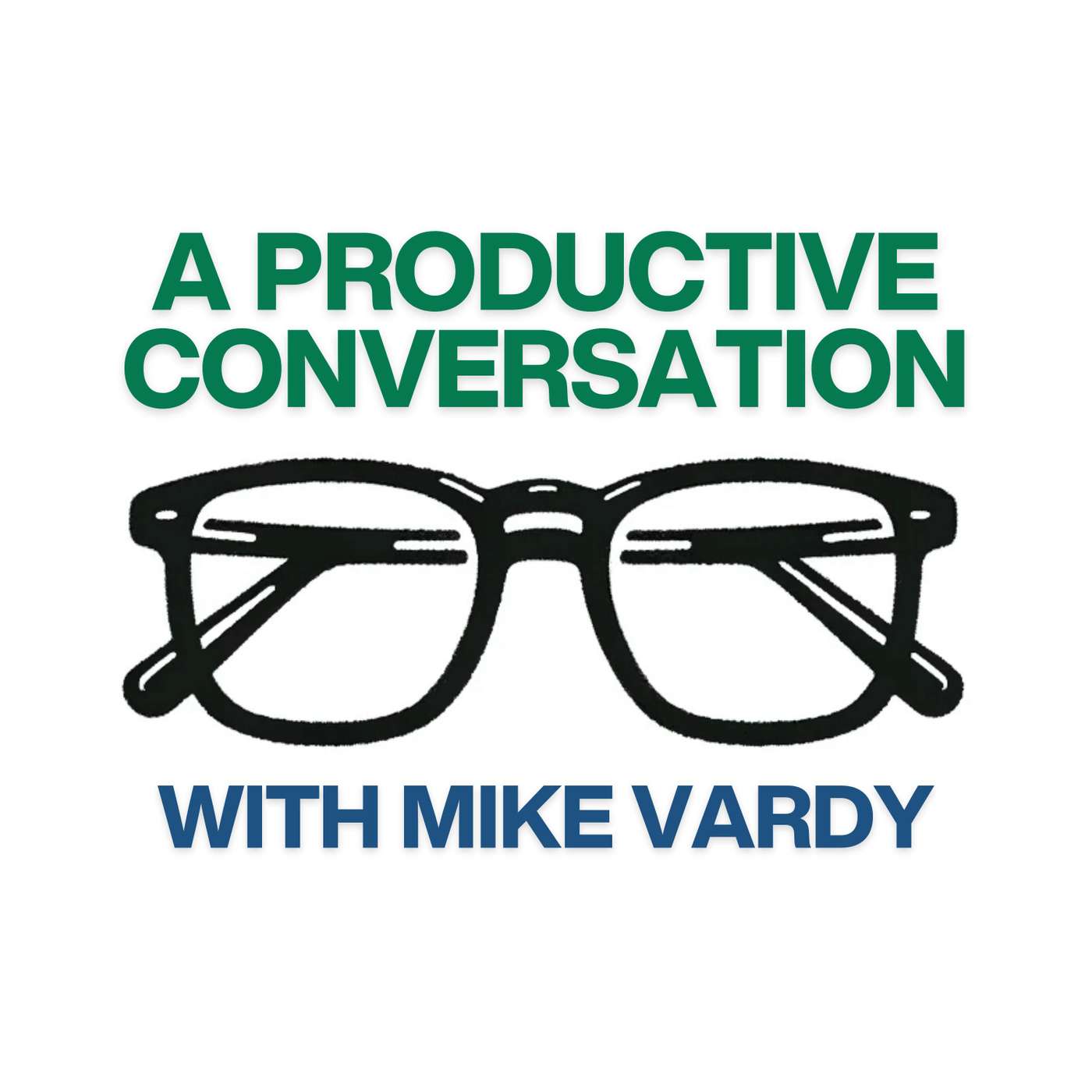
A Productive Conversation
Mike Vardy
Hosted by productivity strategist Mike Vardy, A Productive Conversation offers insightful discussions on how to craft a life that aligns with your intentions. Each episode dives into the art of time devotion, productiveness, and refining your approach to daily living. Mike invites guests who are thinkers, doers, and creators to share their strategies for working smarter and living more intentionally. From practical tips to deep dives on mindset shifts, this podcast will help you reframe your relationship with time and find balance in a busy world.
Subscribe and join the conversation—because a productive life is more than just getting things done.
Subscribe and join the conversation—because a productive life is more than just getting things done.
Episodes
Mentioned books

Jan 14, 2026 • 1h 5min
PM Talks S3E1: Honesty
This episode is the first installment of Season 3 in our monthly PM Talks series, where Patrick Rhone and I slow things down to explore the ideas that quietly shape how we live and work. This time, we start with an act of honesty right out of the gate—being transparent about when the episode was recorded—and let that openness set the tone for everything that follows.From there, the conversation unfolds into something deeper. We talk about honesty not as a moral stance, but as a practical one—especially when it comes to time, commitments, and the stories we tell ourselves about why things don’t happen. January has a way of inviting big intentions, and this discussion is a timely reminder that clarity begins with truth.Six Discussion PointsWhy the hardest lies to spot are the ones we tell ourselvesThe difference between urgency and immediacy—and why it matters“I don’t have time” as a story, not a factHow calendars can act as commitments, not constraintsHonesty about capacity, energy, and personal rhythmsWhy knowing who you are (and aren’t) changes everythingThree Connection PointsPatrick's websiteThe Year Compass (mentioned as a reflection tool)Mike’s upcoming book, Productiveness.Honesty isn’t about being harsher with ourselves—it’s about being clearer. This conversation is an invitation to pause, notice, and tell better stories about what we can actually do with the time and energy we have.

7 snips
Jan 7, 2026 • 48min
Chris Bailey Talks About Intentionality, Values, and Finishing What You Start
In this engaging conversation, Chris Bailey, an expert in productivity and intentional living, shares insights from his latest work. He emphasizes that values—not just goals—drive meaningful actions and decisions. Chris challenges the effectiveness of SMART goals, revealing their potential drawbacks. He introduces the concept of the 'intention stack' connecting values to daily actions and stresses the importance of reflecting on our intentions. This deep dive encourages listeners to align their productivity with their true selves, fostering authentic progress.

Dec 31, 2025 • 1h 5min
A VERY SPECIAL EPISODE: The 12 Tips of TimeCrafting
This is a reflective, solo episode where I share twelve essential TimeCrafting tips—not as rules or resolutions, but as orienting ideas you can return to whenever your days feel scattered or misaligned. Think of this as a pause at the edge of the calendar year, and an invitation to relate to time differently. These tips are meant to be lived with, not completed. You don’t need all twelve. One idea is often enough to begin again. Whether you’re closing out a year or simply noticing that your relationship with time feels off, this episode offers a grounded way to reset without pressure.These twelve tips aren’t meant to be applied all at once—or perfectly. They’re ideas to return to when you notice drift, friction, or fatigue creeping in. Progress doesn’t require dramatic restarts. It asks for awareness, honesty, and the willingness to come back. Wherever you are in your year—or your life—I hope this episode helps you take a gentle step toward what matters.You don’t have to absorb all of this at once—just stay with it, and let one idea meet you where you are.During the episode, I mention both The 12 Days of TimeCrafting (which is a limited time offering) and my membership community. If you become a member, you'll have access to The 12 Days of TimeCrafting beyond its limited-time release period... and so much more. You can learn more about this community here.

Dec 24, 2025 • 54min
Productivity A to Z with Erik Fisher: Volume 2 (Part 1)
Erik Fisher, podcast host of Beyond the To-Do List and productivity specialist, shares insights on the evolving landscape of productivity. He reflects on the changes in productivity thinking over the year and emphasizes the importance of adaptability in daily planning. Topics like aligning intention with attention, the necessity of planned pauses, and establishing boundaries for focus are explored. Erik also discusses the benefits of grounding rituals, iteration over perfection, and the significance of making meaningful work decisions. This engaging conversation reveals how our relationship with productivity can continually transform.
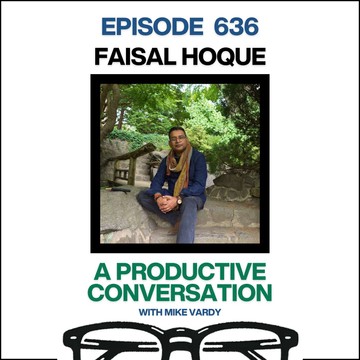
Dec 17, 2025 • 41min
Faisal Hoque Talks About Humanity, AI, and What Comes Next
This time on A Productive Conversation, I sit down with someone who has spent decades at the intersection of technology, leadership, and what it means to remain truly human. Faisal Hoque isn’t just writing about AI from afar—he has lived inside this world for more than thirty years. From founding multiple companies to advising global organizations and government agencies, he brings a rare blend of deep technical expertise and grounded philosophical clarity.In this conversation, we get into his newest book, Transcend: Unlocking Humanity in the Age of AI, and explore the place where innovation meets conscience. We talk about fear and fascination, the frameworks that help us navigate uncertainty, and the practical ways AI is already reshaping how we think, work, and relate. It’s a wide-ranging, honest exchange about what we stand to gain—and what we can’t afford to lose.Six Discussion PointsWhy the rise of generative AI is only the beginning—and why thinking still mattersHow fear and fascination operate as “twin cousins” in our relationship with emerging technologyUsing the OPEN and CARE frameworks as complementary guides for opportunity and riskWhat organizations often overlook when AI governance becomes purely operationalThe philosophical crossroads ahead: outsourcing cognition vs. elevating human capacityHow empathy, devotion, and even love should shape the way we design and interact with technologyThree Connection PointsTranscend: Unlocking Humanity in the Age of AIFaisal’s websiteFaisal’s writing at Psychology TodayGetting to speak with Faisal reinforced something I’ve been thinking about for a long time: technology can extend what we do, but only we can determine who we become. AI may accelerate our output, sharpen our insights, and open new doors—but it can’t choose our purpose. That part remains ours. This conversation left me more convinced than ever that if we want a future worth inhabiting, we have to bring our humanity to the center of it.
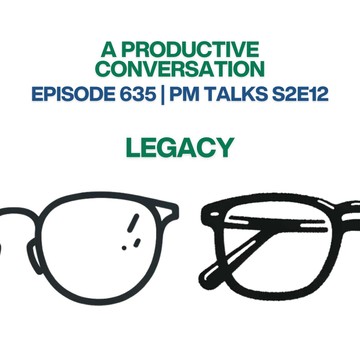
Dec 10, 2025 • 42min
PM Talks S2E12: Legacy
This episode marks the final PM Talks conversation of the 2025 calendar year, and it’s a fitting one: Patrick and I explore legacy — not as something we engineer, but as something that unfolds in the stories others tell about us. As always, this episode is part of our monthly PM Talks series, and it might be the most reflective note we’ve ended on so far.We talk about time, presence, family, uncertainty, and the way small choices echo long after we’re gone. This one weaves philosophy into the everyday in a way that feels real, grounding, and honestly necessary as we close out the year.Six Discussion PointsWhy time feels like it’s accelerating as we age, and how presence slows the smaller slices of our daysThe balance between certainty and agency — and how we navigate what we do and don’t controlWhy trying to “control” your legacy is ultimately a losing battleHow stories — both true and inferred — shape the legacies we inherit and the ones we leaveThe importance of documenting your own story so others don’t have to invent one laterHow everyday tasks, decisions, and moments of presence quietly become the stories others use to remember usThree Connection PointsPatrick’s workThe Productivity DietOur episode on uncertaintyLegacy isn’t a monument — it’s a story, shaped by moments we’re often too busy to notice. This conversation reminded me that what endures isn’t the grand plan, but the small choices, the presence we bring, and the stories people choose to carry forward. Thanks for being with us through another year of PM Talks. There’s a lot more ahead in the next season.
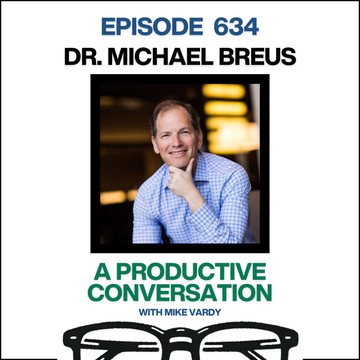
Dec 3, 2025 • 54min
Michael Breus Talks About Sleep, Chronotypes, and the Three Dominoes of Wellness
Most of us think of sleep as a nightly event. Michael Breus thinks of it as a lifelong pattern—a shifting, evolving chronotype that changes as we age. Every time he joins me, we end up deep in the details of how rest, alertness, and biology shape our days. This conversation was no different.In this episode, Michael and I dig into the core ideas behind his book Sleep, Drink, Breathe, why wellness keeps getting more complicated, and how simple habits—done with intention—can create real momentum. We also get into mouth taping, CPAP myths, the rise of at-home sleep tests, and why hydration and breathwork may be more important than most people realize.Six Discussion PointsHow chronotypes shift as we age—and why both of us are noticing that shift right now.The three “dominoes” of wellness and why breathing and hydration often need fixing before sleep.Why wellness feels overwhelming today, and the simple starting points Michael recommends.The real science behind mouth taping and why it can be risky without proper screening.How home sleep testing has changed—and why diagnosing sleep apnea is easier than ever.The Sleep, Drink, Breathe plan and how small, steady habits build lifelong change.Three Connection PointsRead Sleep Drink Breathe: Simple Daily Habits for Profound Long-Term HealthGet Life Gives to the Giver by Joe PolishTake The Sleep QuizConversations with Michael always leave me thinking differently about how deeply biology shapes behaviour. His work reminds me that productivity isn’t a matter of pushing harder—it’s a matter of aligning with the rhythms that already exist. If you’re looking to simplify wellness, understand your changing chronotype, or build habits that actually last, this episode is a worthwhile listen.
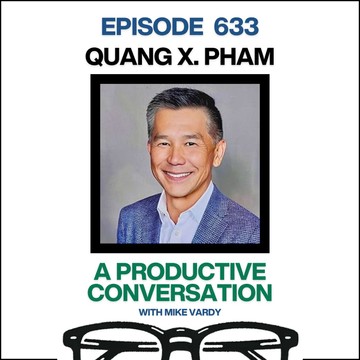
Nov 26, 2025 • 33min
Quang X. Pham Talks About Underdogs and Effort That Delivers Results
In this episode of A Productive Conversation, I sit down with Quang X. Pham — entrepreneur, author, and the first American of Vietnamese descent to become a U.S. Marine Corps aviator. Quang’s story is the definition of an underdog’s rise — from a young refugee in America to leading a Nasdaq-listed biotech company. His new book, Underdog Nation: Zero in on Effort and Results for Success, captures the lessons learned through perseverance, purpose, and performance.Our conversation dives into what it truly means to be an underdog — not just in sports or business, but in life. We explore the power of confronting limitations, committing with conviction, and using adversity as fuel for achievement. Quang’s experiences in the Marine Corps, pharmaceutical industry, and biotech leadership bring nuance and depth to the conversation on resilience, effort, and results.Six Discussion PointsHow arriving in America as a 10-year-old refugee shaped Quang’s early understanding of effort and resultsLessons from his time as a U.S. Marine Corps aviator and how “reading the room” became a leadership skillWhy underdogs must balance confidence with humility — and learn to show up when no one’s watchingThe four “Avenues of Approach” from Underdog Nation: Commit, Confront, Course Correct, and Build CredibilityThe role of patience and decision-making in both biotech innovation and personal growthWhy ego and insecurity are the biggest internal battles underdogs face — and how to replace them with clarity and focusThree Connection PointsVisit Quang's websiteGet Quang's bookWhile you're buying Quang's book, buy Hugh MacLeod's book tooThis conversation reminded me that success isn’t about where you start — it’s about what you choose to confront, commit to, and continue refining. Quang’s story proves that perseverance and patience go hand-in-hand, and that results come to those who focus not on optics, but on outcomes.
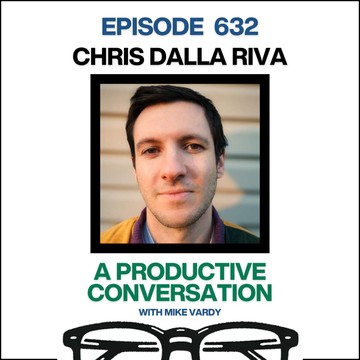
Nov 19, 2025 • 46min
Chris Dalla Riva Talks About Music, Data, and the Stories Behind the Hits
This episode of A Productive Conversation features Chris Dalla Riva, a musician, data analyst, and Senior Product Manager at Audiomack who bridges the gap between creativity and analytics. Chris joins me to discuss his book Uncharted Territory: What Numbers Tell Us About the Biggest Hit Songs and Ourselves.As part of his research, Chris listened to every Billboard Hot 100 number-one song—nearly 1,200 of them—tracking trends, rating songs, and discovering how randomness, technology, and taste shape what becomes a hit. We explore the intersection of numbers and nuance, how data can deepen our understanding of art, and what the patterns of pop music reveal about us.Six Discussion PointsThe origin of Chris’s experiment to listen to every Billboard number-one hitWhy Bob Dylan never topped the Hot 100—and what that says about luck and timingHow data, subjectivity, and quality intertwine when rating songsThe cyclical nature of musical trends, from movies to TikTokThe uneasy relationship between music and technology—from Auto-Tune to AIWhy the album format—and vinyl—still matter in a streaming worldThree Connection PointsCheck out Chris's newsletterBuy Chris's bookRead Mike's essay, The Sound of TimeChris and I cover a lot of ground in this conversation—from Bob Dylan’s surprising chart record to the influence of AI on modern music. If you’ve ever wondered what hit songs say about culture, creativity, and ourselves, this episode hits all the right notes.
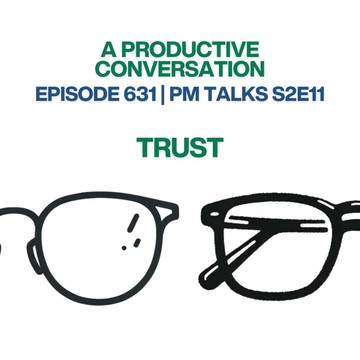
Nov 12, 2025 • 39min
PM Talks S2E11: Trust
This latest edition of our monthly PM Talks series dives into a topic that underpins nearly everything we do: trust. From trusting the moment you’re in to trusting the systems you build, Patrick Rhone and I explore how this single word quietly defines the way we live, work, and connect.In this conversation, we move from the personal—trusting ourselves, our instincts, and our attention—to the societal, exploring what happens when trust erodes in our institutions, technology, and even the tools meant to make life easier.Six Discussion PointsWhy trusting the moment enhances presence—and how presence strengthens trust.How trust manifests in everyday choices, like buying a car or managing a calendar.The connection between simplicity, minimalism, and building trustworthy systems.Why democracy, money, and even productivity all rest on unseen foundations of trust.The difference between a trusted system and your trusted system.How patience, presence, and attention preserve trust over time.Three Connection PointsPatrick's blog post on trustWatch The Big Short and/or Margin CallListen to Episode 596: Curiosity | PM Talks S2E3Trust isn’t static—it’s something we build, test, and sometimes rebuild. Whether you’re trying to trust your tools, your timing, or yourself, I hope this episode helps you see where trust already lives in your life—and where it might need a little reinforcement.


